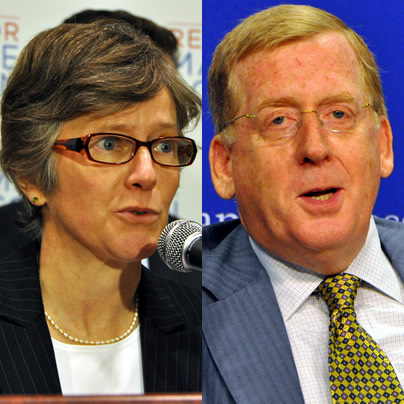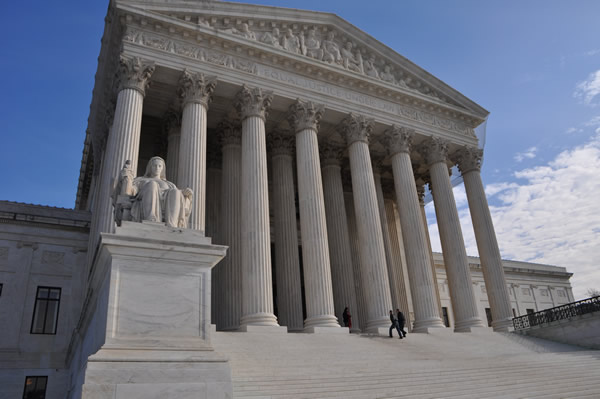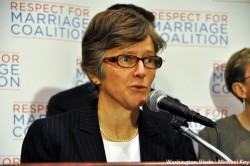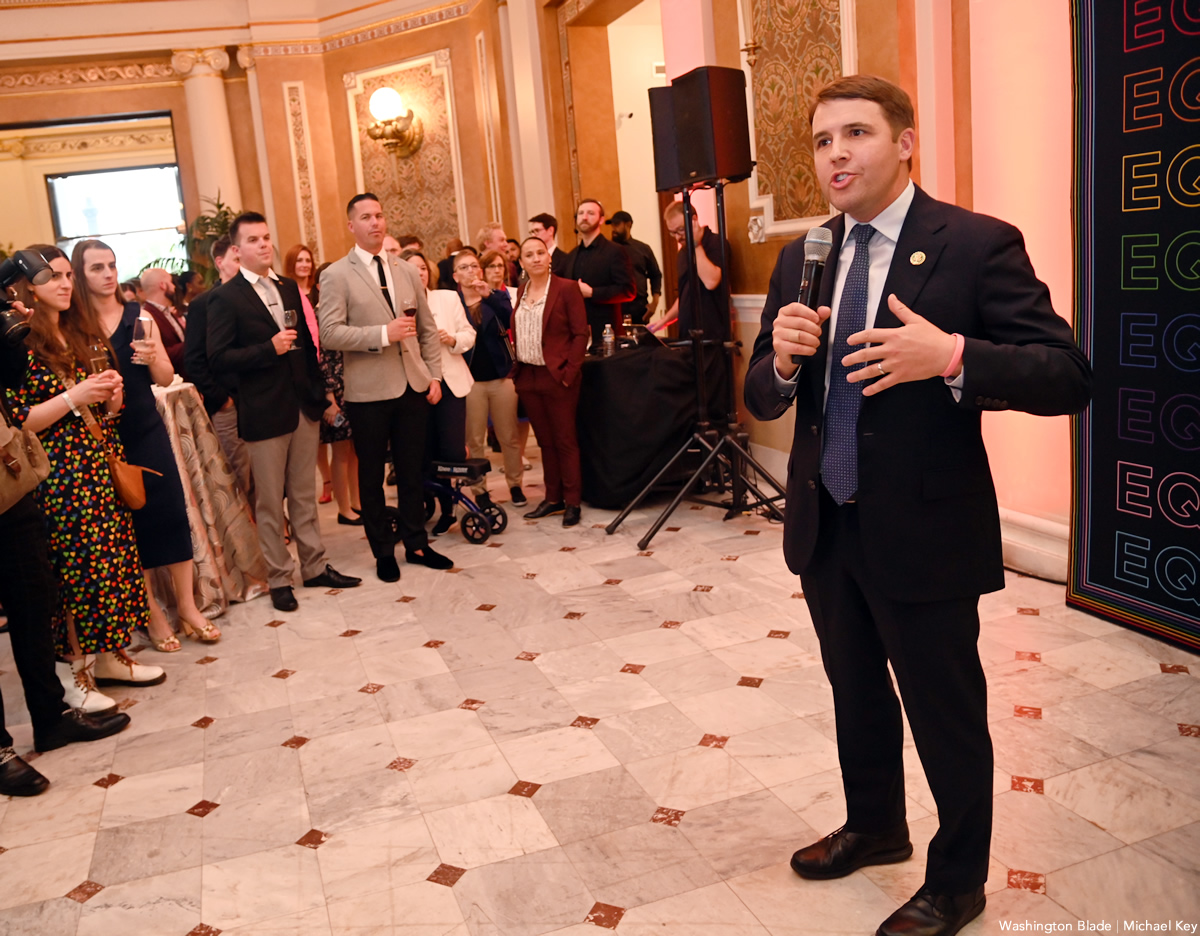Politics
10 years later, another Supreme wait
Attorneys for landmark gay rights cases compare their significance to pending lawsuits


The U.S. Supreme Court (Washington Blade file photo by Michael Key)
Expectations are high as the wait continues for two decisions expected in June on marriage cases before the U.S. Supreme Court, just as they were 10 years ago when gay rights supporters awaited what amounted to landmark rulings in two other cases.
In 2003, two cases reshaped the landscape for gay rights: the U.S. Supreme Court decision in Lawrence v. Texas, which struck down state sodomy laws throughout the country, and the Massachusetts Supreme Court decision in Goodridge v. Department of Public Health, which for the first time led to the legalization of marriage equality in a U.S. jurisdiction.
The two cases currently before the court — Hollingsworth v. Perry, which aims to strike down California’s Proposition 8, and United States v. Windsor, which is challenging the Defense of Marriage Act — are different in many respects from the cases 10 years ago. Lawrence was related to sodomy laws and Goodridge was a state lawsuit that resulted in a change only in Massachusetts. Still, they’re similar in terms of their potential significance.
The two attorneys who made arguments before the courts in the decades-old lawsuits — in the Goodridge case, Mary Bonauto, civil rights director for Gay & Lesbian Advocates & Defenders, and, in the Lawrence case, Paul Smith, a partner at Jenner & Block — acknowledged the magnitude of the cases both then and now, but said it’s hard to compare the significance of the older ones to the newer ones.
Smith said we won’t know the significance of the DOMA and Prop 8 cases until the Supreme Court rules on them, but touted the Lawrence decision striking down sodomy bans across the country as significant in any event.
“It provided the foundation for all the progress that has been made on marriage and other forms of discrimination over the past 10 years,” Smith said. “It did that by establishing that our relationships are just as important and valuable as different-sex relationships and by saying that the government can’t use morality as a justification for interfering with individual choices about who to love and how. With those principles in place it’s very hard for anyone to come up with a legitimate and persuasive justification for discrimination based on sexual orientation.”
Similarly, Bonauto said “it’s not really easy” to compare the significance of the Goodridge case to the Perry and Windsor lawsuits, recalling the different cultural climate 10 years ago in which the Massachusetts case was argued.
“In 2003, these waters were largely uncharted,” Bonauto said. “There were zero marriage states, a civil union system in Vermont, and 36 states with discriminatory statutes and four states with amendments. But then, as now, we were right; right on the constitutional principles and the utter absence of legal justifications for this discrimination.”
Those court rulings — in particular the Goodridge decision because it was the first successful case for full marriage equality in the United States — paved the way for 11 more states to approve same-sex marriage over the course of 10 years, including the legalization of marriage equality in Minnesota just this week.
Just as observers are parsing statements from justices now in an attempt to determine what the court may rule on Prop 8 and DOMA, followers of the court cases a decade ago were also trying to predict the future based on what was said during oral arguments.
In Lawrence, Smith said moderate justices at the time — Associate Justice Anthony Kennedy and then-Associate Justice Sandra Day O’Connor — were “uncharacteristically quiet,” making it difficult to predict how the court would rule.
“But we took hope from the fact that they didn’t say anything negative,” Smith added. “We were relatively optimistic that the court would strike down the sodomy laws once the court decided to take the case.”
For Goodridge, Bonauto said the wait was different from now in two regards: first because same-sex marriage wasn’t legalized anywhere in the country at the time, and second because there was no set timeline for when the Massachusetts Supreme Court had to make a decision.
“We thought and hoped we were right on the timing,” Bonauto said. “There were a lot of nerves and uncertainty while we waited. The fact that we didn’t know when the decision would come — no clue at all — added to the nerves and fueled the rumor factory. In the end, the decision turned out to be beautifully written and world-changing.”
In the present, many observers believe that the Supreme Court will issue a decision that will strike down DOMA on its merits — either based on equal protection or federalism grounds — although issues of standing were examined.
For Prop 8, much attention has been given to justices’ interest in the standing of Prop 8 proponents to defend the measure in court. A determination that they lack standing would leave in place a lower court ruling and likely invalidate the ban on same-sex marriage in California.
The standing issues before the Supreme Court, as Bonauto noted, also means the wait for Goodrige was different because the Massachusetts Supreme Court couldn’t rule on this basis.
“There were no outs,” Bonauto said. “They had to decide whether denying marriage to gay couples violates the Constitution of the Commonwealth or not. And I was asked very specifically in oral arguments about Vermont civil unions and a remedy that would provide those protections, and I said, ‘That was not what the plaintiffs were seeking; they were seeking access to marriage itself.'”
Notably, the oral arguments in Lawrence v. Texas took place on March 26, 2003, which is exactly 10 years to the day that oral arguments took place in the Prop 8 case on March 26, 2013. A ruling was issued in the Lawrence case on June 26, 2003 just as a ruling is expected in the Prop 8 and DOMA cases in June 2013.
In the Goodridge case, oral arguments took place before the Massachusetts Supreme Court on March 3, 2003, but a decision wasn’t rendered until Nov. 18, 2003.

Mary Bonauto (Washington Blade photo by Michael Key)
It remains to be seen whether the wording of rulings from the Supreme Court will have the same power as the language that justices handed down a decade ago. The 4-3 ruling in the Goodridge case affirmed that same-sex couples had the right to marry with never before seen language.
“The question before us is whether, consistent with the Massachusetts Constitution, the Commonwealth may deny the protections, benefits, and obligations conferred by civil marriage to two individuals of the same sex who wish to marry,” the decision states. “We conclude that it may not. The Massachusetts Constitution affirms the dignity and equality of all individuals.”
In the Lawrence case, the 6-3 opinion written by Associate Justice Anthony Kennedy determined that the framers intended language in the U.S. Constitution to be reinterpreted by later generations in accordance with their vision of liberty.
“They knew times can blind us to certain truths and later generations can see that laws once thought necessary and proper in fact serve only to oppress,” Kennedy wrote “As the Constitution endures, persons in every generation can invoke its principles in their own search for greater freedom.”
Also unknown is how the public might react if the Supreme Court issues affirmative rulings for marriage equality in the Prop 8 and DOMA cases.
In 2003, the court ruling in Massachusetts — combined with then-San Francisco Mayor Gavin Newsom’s decision to issue marriage licenses to gay couples — sparked a national backlash that led in the next year to 11 states passing constitutional amendments banning same-sex marriage. Former President George W. Bush ran a successful re-election campaign in which he advocated for passage of a Federal Marriage Amendment.
But Bonauto was skeptical that the legalization of same-sex marriage led to the passage of state constitutional amendments and Bush’s re-election — saying the religious right wanted to enact the amendments anyway and analysis shows the marriage issue wasn’t as much a boon to Bush as it may seem on its face.
“By the time we had filed Goodridge, there were already 36 state statutes and four amendments,” Bonauto said. “So, for a lot of these states, they didn’t have anything else to do but to pass an amendment because they already had statutes barring marriage. So I really view this as political opportunism both with elected officials and also the organized right-wing. It was trying to cut us off and change the facts on the ground, so that they could isolate this debate and isolate this issue in certain states.”
Given the growing acceptance of marriage equality — one widely noted recent poll shows it enjoys support from 58 percent of the American public, compared to 30 percent support in 2003 — the negative reaction to any pro-gay rulings will likely be more restrained.
In the event the Supreme Court in June renders similarly favorable decisions in support of rights for gay couples, Bonauto predicted some would speak out in opposition, but the reaction generally would be favorable.
“There are going to be people who are going to say things, and some of them have echo chambers and bully pulpits and their blogs,” Bonauto said. “I don’t think we should equate that to a backlash. I just think that is what public discourse is like in 2013. I really believe that the overwhelming majority of Americans are at a point where they accept and embrace the freedom to marry for same-sex couples.”
Congress
Democratic lawmakers travel to El Salvador, demand information about gay Venezuelan asylum seeker
Congressman Robert Garcia led delegation

California Congressman Robert Garcia on Tuesday said the U.S. Embassy in El Salvador has agreed to ask the Salvadoran government about the well-being of a gay asylum seeker from Venezuela who remains incarcerated in the Central American country.
The Trump-Vance administration last month “forcibly removed” Andry Hernández Romero, a stylist who asked for asylum because of persecution he suffered because of his sexual orientation and political beliefs, and other Venezuelans from the U.S. and sent them to El Salvador.
The White House on Feb. 20 designated Tren de Aragua, a Venezuelan gang, as an “international terrorist organization.” President Donald Trump on March 15 invoked the Alien Enemies Act of 1798, which the Associated Press notes allows the U.S. to deport “noncitizens without any legal recourse.”
Garcia told the Washington Blade that he and three other lawmakers — U.S. Reps. Maxwell Alejandro Frost (D-Fla.), Maxine Dexter (D-Ore.), and Yassamin Ansari (D-Ariz.) — met with U.S. Ambassador to El Salvador William Duncan and embassy staffers in San Salvador, the Salvadoran capital.
“His lawyers haven’t heard from him since he was abducted during his asylum process,” said Garcia.
The gay California Democrat noted the embassy agreed to ask the Salvadoran government to “see how he (Hernández) is doing and to make sure he’s alive.”
“That’s important,” said Garcia. “They’ve agreed to that … we’re hopeful that we get some word, and that will be very comforting to his family and of course to his legal team.”

Garcia, Frost, Dexter, and Ansari traveled to El Salvador days after House Oversight and Government Reform Committee Chair James Comer (R-Ky.) and House Homeland Security Committee Chair Mark Green (R-Tenn.) denied their request to use committee funds for their trip.
“We went anyways,” said Garcia. “We’re not going to be intimidated by that.”
Salvadoran President Nayib Bukele on April 14 met with Trump at the White House. U.S. Sen. Chris Van Hollen (D-Md.) three days later sat down with Kilmar Abrego Garcia, a Maryland man who the Trump-Vance administration wrongfully deported to El Salvador on March 15.
Abrego was sent to the country’s Terrorism Confinement Center, a maximum-security prison known by the Spanish acronym CECOT. The Trump-Vance administration continues to defy a U.S. Supreme Court ruling that ordered it to “facilitate” Abrego’s return to the U.S.
Garcia, Frost, Dexter, and Ansari in a letter they sent a letter to Duncan and Secretary of State Marco Rubio on Monday demanded “access to” Hernández, who they note “may be imprisoned at” CECOT. The State Department has not responded to the Blade’s request for comment about the correspondence.
Garcia said the majority of those in CECOT who the White House deported to El Salvador do not have criminal records.
“They can say what they want, but if they’re not presenting evidence, if a judge isn’t sending people, and these people have their due process, I just don’t understand how we have a country without due process,” he told the Blade. “It’s just the bedrock of our democracy.”

Garcia said he and Frost, Dexter, and Ansari spoke with embassy staff, Salvadoran journalists and human rights activists and “anyone else who would listen” about Hernández. The California Democrat noted he and his colleagues also highlighted Abrego’s case.
“He (Hernández) was accepted for his asylum claim,” said Garcia. “He (Hernández) signed up for the asylum process on an app that we created for this very purpose, and then you get snatched up and taken to a foreign prison. It is unacceptable and inhumane and cruel and so it’s important that we elevate his story and his case.”
The Blade asked Garcia why the Trump-Vance administration is deporting people to El Salvador without due process.
“I honestly believe that he (Trump) is a master of dehumanizing people, and he wants to continue his horrendous campaign to dehumanize migrants and scare the American public and lie to the American public,” said Garcia.
Congress
Goodlander endorses Pappas’s Senate bid
Announcement puts gay congressman on the path to securing his party’s nomination

U.S. Rep. Maggie Goodlander (D-N.H.) on Thursday announced she will not run to represent her state in the U.S. Senate, endorsing gay U.S. Rep. Chris Pappas’s (D-N.H.) bid for the seat of retiring U.S. Sen. Jeanne Shaheen, putting him on the path to secure the Democratic nomination.
“We are in the fight of our lifetimes right now, of a moment of real crisis and challenge,” she said. “I feel humbled and grateful to so many people across our state who have encouraged me to take a look at the U.S. Senate, and after a lot of thought and conversations with people I love and people I respect and people who I had never met before, who I work for in this role right now, I’ve decided that I’m running for re election in the House of Representatives.”
When asked by a reporter from the ABC affiliate station in New Hampshire whether she would endorse Pappas, Goodlander said, “Yes. Chris Pappas has been amazing partner to me in this work and for many years. And I really admire him. I have a lot of confidence in him.”
She continued, “He and I come to this work, I think with a similar set of values, we also have really similar family stories. Our families both came to New Hampshire over 100 years ago from the very same part of northern Greece. And the values that he brings to this work are ones that that I really, really admire. So I’m proud to support him, and I’m really excited to be working with him right now because we’ve got a lot of work to do.”
Today in Salem @MaggieG603 tells @WMUR9 she is not running for U.S. Senate & endorses @ChrisPappasNH #NHPolitics #NHSen #NH02 #WMUR pic.twitter.com/W2CMrhRuIC
— Adam Sexton (@AdamSextonWMUR) April 17, 2025
“Maggie Goodlander has dedicated her career to service, and we can always count on her to stand up to powerful interests and put people first,” Pappas said in a post on X. “I’m so grateful to call her my friend and teammate, and I’m proud to support her re-election and stand with her in the fights ahead.”
Earlier this month, former New Hampshire Gov. Chris Sununu, a Republican, announced he would not enter the Senate race, strengthening the odds that Democrats will retain control of Shaheen’s seat.
Congress
EXCLUSIVE: Garcia demands answers on deportation of gay Venezuelan asylum seeker
Congressman’s correspondence was shared exclusively with the Blade

U.S. Rep. Robert Garcia (D-Calif.) is demanding answers from the Trump-Vance administration on its deportation of Andry Hernández Romero, a gay Venezuelan makeup artist who was sent to a prison in El Salvador in violation of a federal court order and in the absence of credible evidence supporting the government’s claims about his affiliation with a criminal gang.
Copies of letters the congressman issued on Thursday to Immigration and Customs Enforcement and CoreCivic, a private prison contractor, were shared exclusively with the Washington Blade.
Garcia noted that Hernández, who sought asylum from persecution in Venezuela over his sexual orientation and political beliefs, had entered the U.S. legally, passed a preliminary screening, and had no criminal record.
Pro-bono lawyers representing Hernández during his detention in the U.S. pending an outcome in his asylum case were informed that their client had been removed to El Salvador a week after he failed to show for a hearing on March 13.
Hernández’s family now fears for his safety while he remains in El Salvador’s Terrorism Confinement Center (CECOT), which has a well documented record of human rights abuses, Garcia said.
Additionally, the congressman wrote, while experts say Tren de Aragua does not use tattoos as identifiers, the “primary evidence” supporting Hernández’s deportation based on his supposed links to the transnational Venezuelan gang “appears to have been two crown tattoos labeled ‘Mom’ and ‘Dad,’ which are common cultural symbols in his hometown.”
The determination about his links to or membership in the organization was made by a CoreCivic employee whose criminal record and misconduct as a law enforcement officer led to his termination from the Milwaukee Police Department, Garcia wrote in his letter to the company.
Requesting a response by May 1, the congressman asked CoreCivic President Damon T. Hininger to address the following questions:
- What qualifications and training does CoreCivic require for employees tasked with making determinations about detainees’ affiliations?
- What protocols are in place to ensure that determinations of gang affiliation are based on credible and corroborated evidence?
- How does CoreCivic oversee and review the decisions made by its employees in such critical matters?
- What mechanisms exist to prevent and address potential misconduct?
- What is the nature of CoreCivic’s collaboration with ICE in making determinations that affect deportation decisions? Are there joint review processes?
- What background checks and ongoing assessments are conducted for employees involved in detainee evaluations, particularly those with prior law enforcement experience?
- What guidelines does CoreCivic follow regarding the use of tattoos as indicators of gang affiliation, and how does the company ensure that cultural or personal tattoos are not misinterpreted?
In his letter to Tae D. Johnson, acting director of ICE, Garcia requested answers to the following questions by May 1:
- Did ICE personnel independently review and approve the determination made by CoreCivic employee Charles Cross Jr. identifying Mr. Hernández Romero as a member of the Tren de Aragua gang?
- What evidence, beyond Mr. Hernández Romero’s tattoos, was used to substantiate the claim of gang affiliation?
- Under what legal authority are private contractors like CoreCivic permitted to make determinations that directly impact deportation decisions?
- What vetting processes and background checks are in place for contractors involved in such determinations? Are there oversight mechanisms to ensure their credibility and adherence to due process?
- What guidelines does ICE follow regarding the use of tattoos as indicators of gang affiliation, and how does the company ensure that cultural or personal tattoos are not misinterpreted?
Together with U.S. Rep. Maxwell Frost (D-Fla.), Garcia wrote to U.S. Rep. James Comer (R-Ky.) on Tuesday requesting permission to bring a congressional delegation to CECOT for purposes of conducting a welfare check on detainees, expressing specific concern for Hernández’s wellbeing. The congressmen said they would “gladly include any Republican Members of the committee who wish to participate.”
Hernández’s case has drawn fierce criticism of the Trump-Vance administration along with calls for his return to the U.S.
Influential podcaster and Trump ally Joe Rogan spoke out in late March, calling the deportation “horrific” and “a horrible mistake.”
Last week, California Gov. Gavin Newsom (D) sent a letter to Kristi Noem, secretary of the U.S. Homeland Security, which manages ICE, demanding Hernández’s immediate return and raising concerns with the right to due process amid the administration’s crackdown on illegal immigration.
Hernández “was denied the opportunity to defend himself against unsubstantiated allegations of gang involvement or to present his asylum claim,” the governor wrote. “We are not a nation that sends people to be tortured and victimized in a foreign prison for public relations victories.”
Immigrant Defenders Law Center President Lindsay Toczylowski, who is representing Hernández, has not been able to reach her client since his removal from the U.S., she told NBC News San Diego in a report published April 11.
“Under the Constitution, every single person has a right to due process, and that means they have a right to notification of any allegations the government is making against them and a right to go into court and prove that those allegations are wrong if that’s the case,” she said. “In Andry’s case, the government never gave us that opportunity. In fact, they didn’t even bring him to court, and they have forcefully sent him to El Salvador without ever giving us any notice or without telling us the way that we could appeal their decision.”
“CECOT, this prison where no one has ever left, where people are held incommunicado, is a very dangerous place for someone like Andry,” Toczylowski said.
In March, a DHS spokesperson posted on X that Hernández’s “own social media indicates he is a member of Tren de Aragua,” though they did not point to any specific posts and NBC reported that reviews of his known social media accounts turned up no evidence of gang activity.
During a visit to CECOT in March, Time Magazine photographer Philip Holsinger photographed Romero and reported that the detainee plead his innocence — “I’m not a gang member. I’m gay. I’m a stylist.” — crying for his mother as he was slapped and his head was shaved.
-

 U.S. Federal Courts4 days ago
U.S. Federal Courts4 days agoFederal judge blocks Trump passport executive order
-

 Books4 days ago
Books4 days ago‘Pronoun Trouble’ reminds us that punctuation matters
-

 Theater3 days ago
Theater3 days ago‘Bad Books’ a timely look at censorship in local library
-

 District of Columbia5 days ago
District of Columbia5 days agoGay Men’s Chorus of Washington to celebrate Spring Affair honorees










